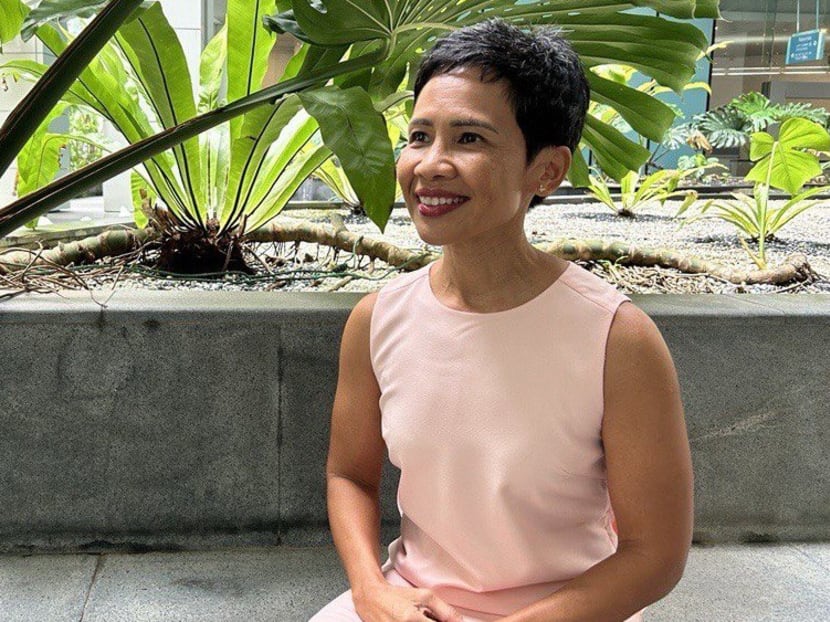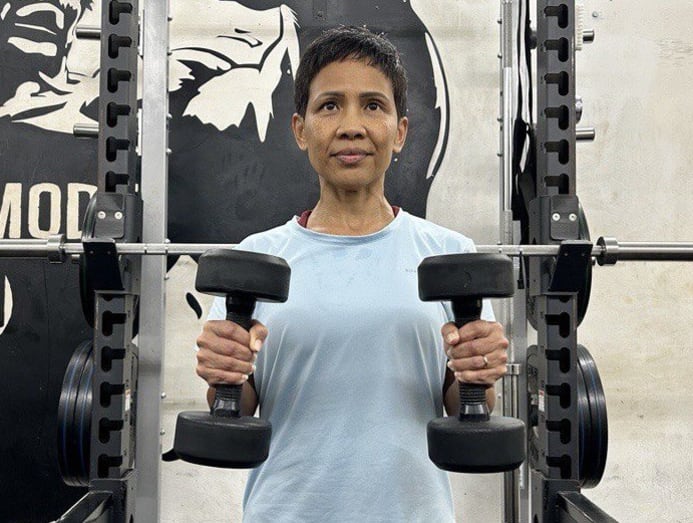She was only 44 when she went into early menopause: 'It felt like I fell off a cliff'
Ming Rodrigues is one of 5 per cent of women who experience early menopause. She began having hot flushes and irregular menstruation at the age of 42. She menopaused two years later, and suffered from insomnia, brain fog and mood swings for seven years until she went on hormone replacement therapy.

After experiencing early menopause and severe mood swings and anxiety, Ming Rodrigues urges other women to seek help for their symptoms. (Photo: Ming Rodrigues)

This audio is generated by an AI tool.
It was 14 years ago, but Ming Rodrigues still remembers the day she cried in her car in 2010.
For a year, her menstrual cycle had become irregular, sometimes stretching to months in between periods. She also experienced hot flushes.
The then-43-year-old went to a fertility specialist to ask about her symptoms. Since she was still vaguely considering having a second child at that time, the specialist put her through a fertility test.
However, the test showed that everything was functioning, and there was no clear diagnosis addressing her symptoms or recourse offered to her, she said.
“Emotionally, I was actually quite a wreck for about a year after that,” she said.
In hindsight, Rodrigues reflected that the specialist may not even have been aware that at age 43, she was cusping on menopause.

A year later, at the age of 44, Rodrigues menopaused – by that point, her menstruation had stopped for a year.
“It just felt like I had turned the corner unexpectedly and I fell off a cliff,” she said.
“I suppose as a woman, you are hoping that you would still be able to conceive in your early forties, that you would still have your period, even though it can be very annoying. It’s almost like these things signal that you’re still a healthy, functioning woman.
“It was like a thief came in the night and took all this away from me. This had a huge psychological impact. I mourned it,” the 57-year-old told CNA Women.
HER MENOPAUSE SYMPTOMS – A DOWNWARD SPIRAL
Her menopausal symptoms got progressively worse. Rodrigues recalled struggling with brain fog and a feeling of confusion in her late forties. She also began to feel fragile.
This baffled her. “I’ve always been active and quite strong. I used to work out four or five times a week doing pretty hardcore strength training, hiking, swimming and running. But my body began to feel fragile,” she said.
Rodrigues recalled that she would suddenly be hesitant to cross a short drain for fear of falling, and take a long route instead. She also became fearful to cycle, climb the stairs or walk downhill. “I thought it was all in my head,” she said.

She suffered from insomnia. “I would wake up two, three times a night... 3am, and I couldn’t go back to sleep till 5 or 6am, by which time, you’re just super exhausted, and your day has to start, so you just have to kind of go through it,” she recalled.
WHAT IS MENOPAUSE?
- Menopause is defined as 12 months after a woman has her last period. It marks the end of a woman’s reproductive years, when the ovaries run out of eggs and the body gradually stops producing the hormone oestrogen.
- Most women experience menopause between the ages of 45 and 55 years. This process may last several years.
- Early menopause occurs in about five per cent of women between the ages of 40 and 45, according to the Office on Women's Health in the United States.
- Common menopausal symptoms include hot flushes, night sweats, insomnia, mood swings, vaginal dryness, bladder problems and skin dryness.
- Not all women experience all the symptoms, and they may vary from mild to severe.
As Rodrigues’ symptoms progressed, even her loved ones noticed the change.
In 2017, Rodrigues shared a vacation picture with her best friend, who reached out in concern. “She said, you don’t look well,” she recalled.
Rodrigues said her skin had become very crepey – thin and dry. “For many years, people always think that I look younger than I actually am. But for once, I was actually looking my age. I was looking really tired.”
She also had severe mood swings and lashed out at her husband and then teenage son for “very small stuff”.
“I was very sensitive about everything my son said to me. I was always crying and I was hurtful. I knew that it wasn’t really me. I didn’t like the person I was becoming as a mother,” she told CNA Women.

“For a long time, I felt like everything about me was disintegrating. I was in this spiral. And it eventually led to me being in such a dark place mentally,” she added.
By 2018, Rodrigues said she was going through pretty severe depression. “All I could feel was this darkness descending, just overwhelming everything. Everything was in a shroud,” she said.
“I felt like, is this what it is like to be middle age? Is this what they mean by twilight years? Surely, there has to be a better way to age, right?”
SEEKING HELP FOR HER MENOPAUSE
Things reached a tipping point and Rodrigues began researching menopause in 2018, seven years after she menopaused. She was 51 then and decided to see her gynaecologist about going on hormone replacement therapy (HRT).
HRT is one of the most commonly prescribed drug treatments for menopause, and replaces oestrogen and sometimes progesterone, hormones that the body no longer produces in sufficient amounts after menopause.
As HRT is known to increase the risk of breast cancer, Rodrigues underwent a mammogram and BRCA gene test to check if she is a carrier of a gene mutation which increases her risk of getting breast cancer. She tested negative for both.
She also did a bone density test, which revealed that she was close to having osteoporosis as a result of menopause and the lack of oestrogen, she said.
“It was a blow to me because I’m active. I do a lot of weight-bearing exercise, but yet my bone density was so low,” she said.
She added that this could explain why she felt fragile – it was a signal from her body that she had weak bones and could not bear a fall.

After these tests, Rodrigues started on HRT pills. “Within two weeks of taking HRT, my entire life was transformed. It was like, why did I not do this till now?” Rodrigues, who is a senior media relations manager at an international taste and nutrition solutions provider, said.
“My skin became better. I slept better. Most significantly, I felt like a normal human being. I wasn’t snapping at people, and I didn’t feel that brain fog and depression,” she said.
THRIVING AFTER MENOPAUSE
Rodrigues has been on HRT for six years and suggested that other women with severe menopause symptoms consider it if their gynaecologist thinks they are suitable candidates.
She also urges more women to speak up about their menopause experience, and seek medical and social support.

“Don’t be ashamed of what you’re going through. Don’t listen to naysayers or people who put it down to old age, because it may not be just the ageing process,” she said.
“People in my parents’ generation never had all that support back in the day. But now we have all the resources. We just need to educate ourselves and be open-minded,” she said.
“In Asia… menopause is still not very much talked about and swept under the carpet. Oftentimes, this journey can be very lonely. The support network is very important to help you cope better.”
She also urged men to support the women in their lives through this transition – their mother, wife, sisters and friends. “Men can be allies in a woman’s menopause journey. They can take the initiative to learn more and talk to women they are close to,” she suggested.
Having come through this challenging journey, Rodrigues believes that women can still enjoy quality of life after menopause. “You need to continue doing the things that ground you and bring you joy.
“Ageing shouldn’t be something to be feared. Whatever challenges you go through, you just deal with it as it comes – and come out of it a much stronger person,” she said.
CNA Women is a section on CNA Lifestyle that seeks to inform, empower and inspire the modern woman. If you have women-related news, issues and ideas to share with us, email CNAWomen [at] mediacorp.com.sg (CNAWomen[at]mediacorp[dot]com[dot]sg).













